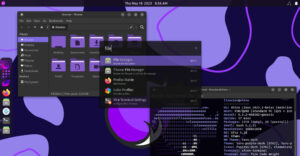
I love life and I love having choices. I guess you can say I am pro-life and pro-choice. Unfortunately, for most people those labels represent the opposing sides of a very divisive issue.
The curious thing is that these terms are not really descriptive of the issue at all. In fact, unless you know what those labels refer to, they don’t even appear to be related to the same debate. It is only through repeated use that we learned how to translate the words “pro-life” and “pro-choice” to symbolize a particular point of view on abortion.
That’s just one example of how labels can box us in. Labels force us to expend a lot of energy explaining them and to devote too many resources to pinning them on others. We have labels for everything, including software — where people involved in the development, distribution, and use of software take positions and assign labels to each other depending on their points of view. With dozens of labels representing dozens of positions, we run the risk of becoming hopelessly lost unless we can agree on some neutral ground.
Neutral Labels for Software
Take, for example, “open source.” That used to be a simple term for software where the source was visible to the end user, who could use it as needed. Now it implies software licensed with source code provided and no copyleft provisions, at least to some. To others, the term includes “free software,” which is not to be confused with another label — “freeware.” As a compromise — or as a bold political move depending on your point of view — the term “free and open-source software” (FOSS) was promoted as the umbrella term for open-source and free software. Perhaps that sounds better than “open-source and free software” (OSAFS) does.
Before we get too entrenched in labels promoted by those with partisan agendas, can we find some neutral yet descriptive labels for various forms of software distribution and licensing? If we don’t, won’t our dialog become strained and make rational debate difficult?
By Any Other Name
Cheese is a good example of how labels can be misleading. If a restaurant patron orders Roquefort cheese on his salad, can he be certain it comes from Roquefort, France? If he is not really concerned with its country of origin, he might more properly ask for “blue cheese.” Americans are not as concerned as Europeans are that foods labeled with geographical indicators are actually from those locations.
Europeans expect that cheddar cheese actually comes from Cheddar, England, and that Parmesan cheese comes from Parma, Italy. It is probably a safe bet that most Parmesan cheese in the U.S. comes from local dairies.
Without descriptive labels, dialog is difficult. Imagine asking for some “hard cheese that is yellow and gets shredded or grated and is sometimes put on pasta or pizza.” That would be one option if Parma could successfully remove the label “Parmesan cheese” for any cheese not made in Parma, Italy.
Take the Initiative
Partisan parties do not have a strong incentive to come up with neutral labels, so they create labels that enhance their positioning or convince others that their position sounds like the obvious choice. However, even commonly used labels can be drowned out by opposing parties with enough money and time to promote their own agendas. Thus, it is important for neutral parties to move quickly to establish new names that will take hold. If they can accomplish that objective, the subsequent debates might make more sense.
The music industry and companies that sell boxed software are very good at promoting labels that shape public opinion toward the industry’s point of view. For example, if someone uses boxed software but does not pay for his or her own copy, they call it “piracy.” But if someone pays for boxed software and never uses it, they call that “good marketing.”
Richard Stallman argues that “copyright protection” is a biased term, because protection is something that keeps us safe. To be fair, he also concedes that “copyright restriction” is biased in the other direction. He suggests “copyright” as the neutral term.
“Software sales” is another term that has traction, even though it is hard to find an instance of software actually being sold. Per-copy licensors want consumers to think they are buying something that they can actually own, but the fine print says all they really got was a license.
Umbrella Labels
The software industry uses neutral terms as umbrella labels to cover various forms of open-source software and free software. Some work well, but others could stand some improvement. For example, consider the label “Free and Open- Source Software” or “FOSS.” It mainly reminds us that Bruce Perrens and Richard Stallman have different philosophies about software, but it really does not accurately describe what it refers to. Perhaps “open-licensed” software would be a more appropriate term.
We need a neutral label for software that is not “open-licensed” but instead is licensed on a per-user, per-seat, per-server, or per- something basis. Those in the Stallman camp would want such software to be called “proprietary” software, intending that to be a pejorative term. Others, such as those who sell such software, might prefer to use “commercial” software. This highlights the fact that licensing revenue from the software can be extracted from users for development and improvement.
The Free Software Foundation (FSF) uses “commercial” to describe open-source or free software that is commercially marketed. Of course, an open license makes it difficult to charge for second and third copies of software, so companies that need to make revenue off their open-source software often use the term “monetized open-source software”.
Finding Common Ground
The FSF suggests that what is now known as “freeware” be called “noncopylefted free software”. Perhaps we should refer to typical freeware as “noncopylefted free software without source code access.” It sure is descriptive, but it is quite a mouthful. Another term might work better.
The term “copyleft” works well because it serves the interests of both sides of the debate. As for “GPL” — only advocates like it because it conveys the opposite of copyright, and in the GPL world, copyright is considered a bad thing when applied to software. Advocates for intellectual property rights like it because it paints the users of copyleft as being out in left field and indicates they lean to the far left politically.
Let’s Not Get Carried Away
Admittedly, asking various communities of interest to come up with descriptive neutral terms that are not intended to frame the debate carries an inherent risk that this endeavor can get completely out of hand. Back in the 1970s, unmarried couples began living together in such high numbers that society struggled to find alternative ways to say “boyfriend/girlfriend” that implied more than just a dating relationship.
“Living in sin” was too judgmental. “Roommates” ignored the intimate nature of the relationship. Linguists and moralists anguished until they finally came up with POSSLQ — pronounced “possel-que” — which was the abbreviation for “persons of opposite sex sharing living quarters.”
Please. I’m begging you. Don’t let this happen to software.
Phil Albert, a LinuxInsider columnist, is a patent attorney and partner with the San Francisco office of the intellectual property law firm Townsend and Townsend and Crew LLP.












































